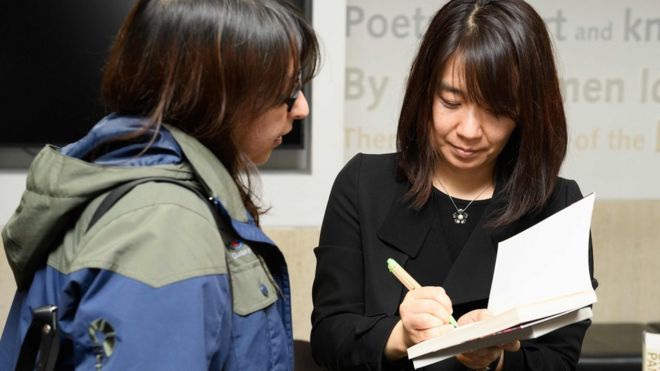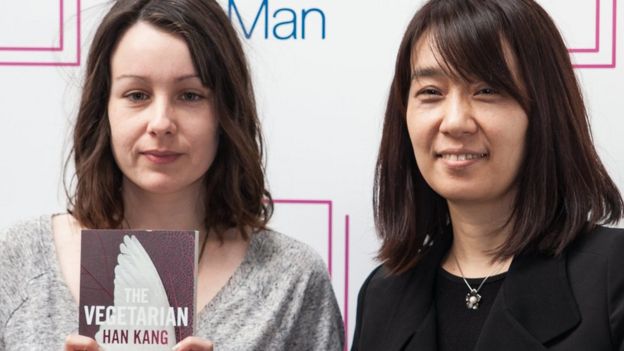- 1 hour ago
- Entertainment & Arts
-
(아시아) 한강의 <채식주의자> 맨부커(Man Booker)賞 수상국제문제/아시아 2016. 5. 17. 19:35
출처: http://www.bbc.com/news/entertainment-arts-36303604
Han Kang's The Vegetarian wins Man Booker International Prize
 AFP/GETTY IMAGES
AFP/GETTY IMAGESThe judges said Han Kang's style was "both lyrical and lacerating" The Vegetarian, a novel about a woman who "wants to reject human brutality" and gives up eating meat, has won the 2016 Man Booker International Prize.
The book was translated by Deborah Smith, who only started teaching herself Korean in 2010.
Judging panel chairman Boyd Tonkin said South Korean author Han Kang's work was "unforgettably powerful and original".
The writer and her British translator will split the award's £50,000 prize money.
The pair saw off competition from Turkish Nobel Laureate Orhan Pamuk, Italian writer Elena Ferrante, Angolan wordsmith Jose Eduardo Agualusa, Chinese author Yan Lianke and Austrian novelist Robert Seethaler to take the prize.
Smith, whose only language was English until she was 21, decided to become a translator on finishing her English Literature degree having noticed the lack of English-Korean translators.
'Exquisite and disturbing'
She said she was "certainly not a born Korean speaker" and still spoke Korean "very much like somebody who learned it from a textbook".
"I had no connection with Korean culture - I don't think I had even met a Korean person - but I wanted to become a translator because it combined reading and writing and I wanted to learn a language.
"Korean seemed like a strangely obvious choice, because it is a language which practically nobody in this country studies or knows."
She said she initially tried to translate the book for a publisher after only learning Korean for two years, but the translation was "awful".
However, after publisher Portobello Books asked her if she had a Korean book that would be "right for their list", she had another go at translating a year later.
 ROGER BLAGG
ROGER BLAGGSmith (left) had only been learning Korean for a few years when she began the translation She has gone on to translate a number of Korean texts, including two Bae Suah works - The Essayist's Desk and The Low Hills of Seoul - and has recently founded a not-for-profit publishing house dedicated to Asian and African literature.
The Vegetarian was creative writing lecturer Han Kang's first novel to be translated into English. Her second, Human Acts, has since been published.
She said the story came about when she revisited her own short story The Fruit of My Woman, which sees a woman literally turn into a plant.
"After I finished the short story, I found this inexplicable feeling that I had to rework this imagery."
Vincent Dowd, Arts correspondent
Deborah Smith taught herself Korean and was smart enough to spot there was a need for translators to turn the language into high-quality English - which she managed brilliantly with The Vegetarian.
The prose is relaxed and idiomatic but it's powerful. There isn't a paragraph or turn of phrase which feels like it didn't originate in English.
The story is deliberately mysterious but Smith said she couldn't ever call up Han Kang to ask how a particular event or character was to be regarded.
"I didn't have any way of contacting her and, as a first-time translator, I wasn't even sure what the etiquette was. Was I even allowed to ask questions? So I just got on with putting the book into English."
The fact that the translator of The Vegetarian comes with an engaging personal story may focus attention on the work of translators generally.
That would be a happy result because the lowly status of much literary translation is one of the considerations behind a big rethink this year of how the Man Booker International Prize works.
Tonkin said the judges were unanimous in their choice of winner.
"In a style both lyrical and lacerating, it reveals the impact of this great refusal both on the heroine herself and on those around her.
"This compact, exquisite and disturbing book will linger long in the minds, and maybe the dreams, of its readers."
This is the first time the Man Booker International Prize, which has joined forces with the Independent Foreign Fiction Prize, has been awarded on the basis of a single book.
Previously, the Man Booker International was awarded every second year to an author for their entire body of work, and was most recently won by Hungarian writer Laszlo Krasznahorkai in 2015.
'국제문제 > 아시아' 카테고리의 다른 글
(아시아/인도) 인도 타밀나두州 음주 금지조치 내릴 예정 (0) 2016.05.19 (아시아/인도) 인도 가뭄 해결 위해 강물 줄기 돌린다 (0) 2016.05.18 (아시아) 맨부커(Man Booker) 수상작 번역자는 어떻게 한국어를 배워서 수상하게 되었나? (0) 2016.05.17 (아시아/방글라데시) 방글라데시 번개 맞아 50명 사망 (0) 2016.05.15 (아시아/몽고) 몽고의 혹한 드줏 (0) 2016.05.15